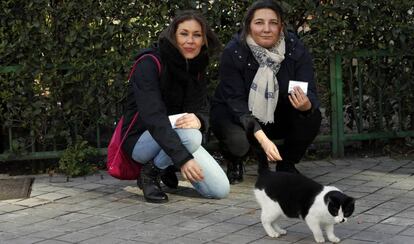License to feed: Madrid’s new scheme for dealing with feral cats
Volunteers have been charged with looking after Spanish capital’s 400 stray cat colonies

Nobody knows just how many stray cats there are on Madrid’s streets, but council sources put the total number of colonies at 400. Now, in an attention-grabbing initiative, authorities in the Spanish capital have, over the last month, enlisted over 100 people as official cat caregivers – licenses and all.
These people, all volunteers, have been tasked with feeding the city’s army of street cats at their own expense, and will also fork out for any veterinary costs. City health authorities will cover the basic service of spaying and neutering the animals, and fitting them with microchips.
I used to feel like a criminal when I gave food to the cats because I could be fined Araceli Jurado, cat caregiver
The aim of the project, which is run by the city’s health department, is to reduce the number of stray cats and “integrate them into neighborhoods without causing a problem for residents,” according to María José Montes, who is with the Madrid Animal Protection Center.
Under the scheme, there are two types of volunteers: coordinators and caregivers. The first group will act as intermediaries between city officials and animal protection groups, while the second group will feed the animals, clean the sites where they live, and carry out capture, sterilization and release procedures.
Volunteers are only authorized to work with one cat colony, and licenses cannot be transferred. Madrid City Hall says thousands of cats have already been microchipped at the 400 registered colonies.
“In the past, authorities would round up the cats and put them down. But the new solution is to sterilize [the cats] so that there are fewer of them, and control the population,” says Arancha Sanz, who is with the Society for the Protection of Animals and Plants in Madrid.
The new cat licenses can be applied for online, and volunteers must attend a one-day course on procedures to be followed.
Madrid’s stray cats
Fátima Monzón, with the Society for Animals and Plants, says that while there are no official figures for the number of stray cats in Madrid, the number is thought to be around 100,000.
In terms of birth rates, Monzón says “Mollys,” as female cats are known, generally give birth two to three times a year, thus having about 12 kittens annually.
Luis, who has already been informally looking after a colony of cats for eight years, has applied for the municipal license. “My colony has 14 cats but there used to be more than 30,” he says, admitting that looking after the animals is expensive.
“I spend at least €100 a month on sterilization, €40 on dry food and €40 on cans,” he says, adding that he has been threatened by people who view cats as a source of disease.
Araceli Jurado has had her license since December and looks after a group of six cats in Madrid’s Moratalaz district. “I used to feel like a criminal. We had to hide to give food to the cats, and we were afraid because we could be fined,” she says.
She says that looking after the group doesn’t take much time and she enjoys doing it, even though some residents have insulted her and threatened to call the police.
But María José Montes, of Madrid’s Animal Protection Center, says current municipal laws only prohibit the feeding of stray cats when doing so can cause inconvenience or damage, or sanitation problems.
English version by George Mills.
Tu suscripción se está usando en otro dispositivo
¿Quieres añadir otro usuario a tu suscripción?
Si continúas leyendo en este dispositivo, no se podrá leer en el otro.
FlechaTu suscripción se está usando en otro dispositivo y solo puedes acceder a EL PAÍS desde un dispositivo a la vez.
Si quieres compartir tu cuenta, cambia tu suscripción a la modalidad Premium, así podrás añadir otro usuario. Cada uno accederá con su propia cuenta de email, lo que os permitirá personalizar vuestra experiencia en EL PAÍS.
¿Tienes una suscripción de empresa? Accede aquí para contratar más cuentas.
En el caso de no saber quién está usando tu cuenta, te recomendamos cambiar tu contraseña aquí.
Si decides continuar compartiendo tu cuenta, este mensaje se mostrará en tu dispositivo y en el de la otra persona que está usando tu cuenta de forma indefinida, afectando a tu experiencia de lectura. Puedes consultar aquí los términos y condiciones de la suscripción digital.








































